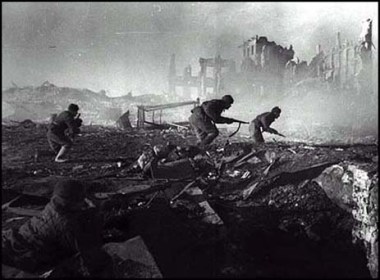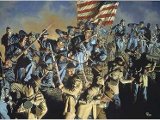The Battle of Stalingrad

Despite the fact that the German plan to achieve a quick victory over the Soviet Union (Operation Barbarossa) has failed after the defeat in the Battle of Moscow, the war was going quite well for the Axis in 1942. The German line in the Eastern front stabilized by spring 1942, the U-boats in the Atlantic were successfully fulfilling their mission, while the "Desert Fox" as the commander of the Afrika Korps Erwin Rommel is often referred to captured the port city of Tobruk in the present-day Libya and came very close to capturing the Suez Canal which would give Germany an unlimited access to oil in the Middle East. The Army Group Center which was devastated by the defeat at Moscow and the harsh Russian winter was reinforced and re-equipped, and Hitler was certain that he can still defeat the Red Army.
In July 1942, Adolf Hitler ordered the general of the 6th Army, Friedrich Paulus to capture the city of Stalingrad. There is some debate about the Hitler's decision to attack Stalingrad. The capture of the city was of major strategic importance because it would enable the Germans to secure the oil fields in the Caucasus, while the city was also an important communication center as it controlled the waterway and rail communications in south Russia. However, some historians speculate that Hitler was primarily driven by the city's name which bared the name of the Soviet leader. By taking the "Stalin's city", Hitler would inflict a major blow to the authority and morale of his adversary. Stalin, on the other hand, probably wanted to prevent the fall of the city that was named after him for the same reason and he ordered it to be defended at all cost. Thus the stage for the bloodiest battle was set in advance.
The Army South Group which was given the task to capture the Russian oil fields in the Caucasus (Case Blue) was split into two armies on Hitler's order in July 1942. Army Group A that was commanded by Wilhelm List was ordered to continue to advance to Caucasus, while the Maximilian von Weichs' Army Group B which consisted of Paulus' 6th Army and 4th Panzer Army commanded by Hermann Hoth was ordered to move east and capture Stalingrad. Paulus and Hoth meet relatively little resistance while advancing towards the Stalin's city but their advance was prolonged due to difficulties with supply and thus they reached the city only on August 23, 1942. The Soviet generals were aware of the German intentions but they were no match to the superior German tanks and artillery. The so-called Stalingrad Front that was set up to halt the German advance was defeated, while the rest of the Red Army was trapped inside the city. While Paulus was preparing to enter Stalingrad, the Luftwaffe was bombarding the city and turned it into ruins which, however, would later prove to give a major advantage to the Red Army because the ruined buildings made it impossible for the tanks to enter the city which in turn significantly diminished the German technological superiority.
Paulus entered Stalingrad on September 12 but his soldiers were faced with bloody hand-to-hand combat as the Russians refused to surrender. By the end of September, the Germans controlled more than one half of the city and Hitler announced the public that Stalingrad will fall. Paulus, however, failed to gain control over the entire city. As soon as a new area was captured, it was retaken by the Red Army which continuously received reinforcements. And the deeper Paulus advanced into the city, the heavier the street fighting involving hand grenades, pistols, rifles, machine guns and other hand weaponry he faced. The tanks were virtually useless, while the German soldiers were also under a constant threat of snippers who were hidden in the ruins as well as machine-gun nests and camouflaged artillery positions. Both Hitler and Stalin insisted on capturing and defending Stalingrad, respectively, and the bloody street fighting continued.
Although both sides suffered heavy casualties in the fierce fight for every building, human loss was causing greater problems to the Germans than the Soviets despite the fact that they had heavier loses. By the early October, Paulus lost about 40,000 men and asked Hitler for reinforcements. But as soon as new German troops arrived to the city, Stalin sent new ones as well. In the second half of October, Paulus was running short of food and ammunition. Despite that he decided to launch an attack on November 10. Fierce resistance of the Red Army forced him to retreat, while Zhukov prepared for a counter-offensive called the Operation Uranus.
The Russian counter-attack started on November 19 when the Red Army attacked the weak flanks of the 6th Army which were defended by the Romanian and Hungarian troops. The were quickly overrun and the Paulus' 6th Army was soon encircled. Paulus was aware that he is at risk of being trapped but he refused to attempt a breakout because Hitler ordered him to hold the positions. By November 23, about 250,000 to 300,000 German soldier were encircled by Zhukov's forces. Hitler promised Paulus to provide him supplies through the air but less than a quarter of needed supplies were delivered to the encircled army by the Luftwaffe. By the beginning of December, Paulus and his forces were starving.
Hitler apparently realized the seriousness of the situation and sent Erich von Manstein and the 4th Panzer Army to rescue the encircled army. However, he was forced to withdraw on December 27 to avoid being encircled himself. By the end of January 1943, the position of the 6th Army was hopeless and there was not much to do other than surrender although Hitler ordered Paulus to fight to the last men. On January 30, he even elevated him to the rank of field marshal and send him a note that no German field marshal was ever captured by the enemy which many historians view as a hint to commit suicide. However, Paulus did not understand or refused to understand Hitler's hint and surrendered on February 2.
The Battle of Stalingrad was a major turning point in World War II, especially in the Eastern Front because the Germans could not replace the losses at Stalingrad. More than 91,000 men were captured, while about 150,000 died during the encirclement. The total German casualties are estimated to 500,000 to 850,000 killed, wounded or captured, while the Red Army suffered over 1,2 million casualties.




